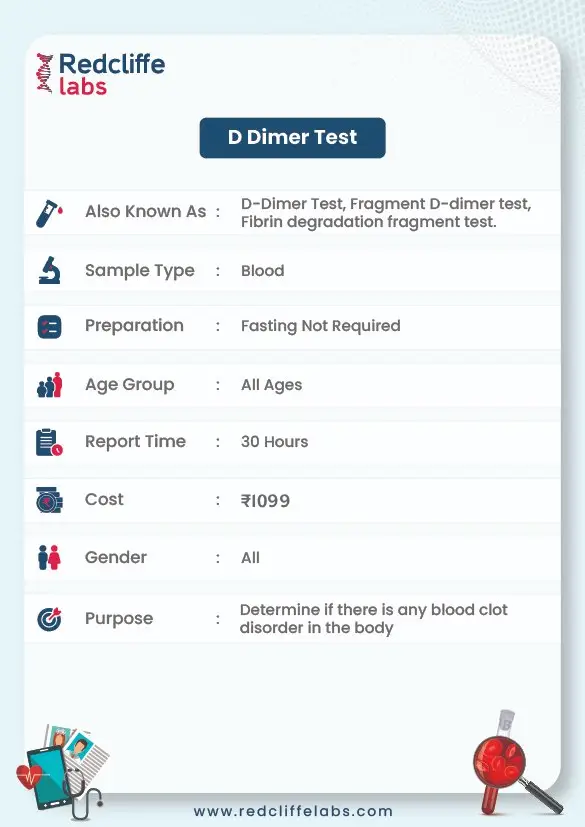Blood
Unlock special
discount on
this package
Login to Unlock 🔓
Test Criteria
Also Known As
fragment D-dimer Test, Fibrin Degradation Fragment Blood Test, Disseminated Intravascular Coagulation ScreeningBooking Benefits Unlocked Worth FREE 799

Report Consultation

Diet Plan
*Available once your report is generated.
At Redcliffe Labs, we have a single goal: to give India its right to quality diagnostics.
Customers served
Tests Processed Everyday
Cities
Collection Centres
World Class In-house Labs
Home Collection Experts
1 Test Parameters
D-Dimer
1 PARAMETER INCLUDED
1 PARAMETER INCLUDED
- D-Dimer
Helps you know your test better
Who all are eligible for D Dimer test?
- People with deep vein thrombosis and pulmonary embolism, which are blood clot-related disorders.
- People with a family history of blood clotting.
- In the cases of knee replacement, broken foot, and leg, antiphospholipid syndrome, major surgery, and some cancers.
- During the COVID-19 infection.
Why take D Dimer blood test ?
- The test helps to detect serious blood clot disorders like deep vein thrombosis, pulmonary embolism, and disseminated intravascular coagulation (DIC).
- In the case of the COVID-19 infection, it shows the clot in the body.
What are the benefits of D Dimer test?
- It is used to check how the treatment is working, especially in the case of disseminated intravascular coagulation.
- It helps the doctor to figure out blood clots and to prevent life-threatening diseases.
- It’s also used to check on the treatment and how the treatment is working.
- It is also helpful in various infections, certain cancers, and liver diseases.
- This is very useful in monitoring the COVID-19 infection and its progression in the patients.
- It helps with timely intervention, hence lowering the fatality rate.
- The test is critical in the event of a pandemic (COVID-19).
Top Booked Health Checkup Packages
Parameters 94
Parameters 96
Parameters 90
Parameters 96
Parameters 100
Helps you know your test better
Q. How can I book my test?
Q. In how much time will I get my test report?
Q. Where can I see or get my test results?
Q. Is home sample collection available for D Dimer test?
Verified by Medical Expert

Written By
Komal Daryani

Verified By
Dr. Mayanka Seth

Introduction to D-Dimer Test
Everyone knows the importance of blood for the body’s survival, it is known as the body’s savior because of the multiple it carries out without which it would be difficult to survive. Blood has two major roles that are very important for life support, it carries oxygen to all the parts of the body and is responsible for clotting if there are any injuries or damages in the veins which does not allow excess loss of blood.
Blood clots are gel-like clumps that form inside your blood vessels. They're a helpful process most of the time. When you get injured, your body naturally forms a clot to seal the wound and stop you from bleeding too much.
However, problems arise when clots form when they shouldn't or don't dissolve as they normally would. These abnormal clots can block blood flow and lead to serious health issues.
This is why if doctors suspect that you could be having any blood clot-related disorder, they suggest getting the D Dimer Test done. D Dimers are protein fragments that help in the breaking down of clots in the blood, normally there are very little or no traces of them in the blood, however, if the results show their presence then your body might be having some blood clot disorder.
If your doctor has suggested you take the D Dimer Test and you are looking for a place to get tested, you can book your test with Redcliffe Labs. You can avail of the home sample collection service and get your blood sample collected from the comfort of your home. You even receive the results online within the stipulated timeframe.
Test Details:
| Also Known As | D-Dimer Test, Fragment D-dimer test, Fibrin degradation fragment test. |
| Purpose | Determine if there is any blood clot disorder in the body |
| Preparation | Refrain from drinking alcohol or smoking before the test |
| Fasting | Fasting Not Required |
| Get Reports Within | 30 Hours |
| Cost | INR 1099 |

What is the D Dimer Test?
A D-dimer blood test is a simple test that checks for blood clotting issues. It measures a protein fragment called D-dimer, produced when your body breaks down clots. Normally, there's little to no D-dimer present.
Doctors order this test if you have symptoms of a blood clot, like leg swelling or chest pain. A high level might suggest a clot, but further tests are needed for confirmation.
This test is helpful for ruling out clots, not diagnosing them. It's most commonly used in emergency situations for conditions like pulmonary embolism (PE) or deep vein thrombosis (DVT).
Conditions detected by the D Dimer Test:
The D-dimer blood test itself isn't used to diagnose specific conditions definitively. However, an elevated D-dimer level can indicate potential for blood clot-related conditions. Doctors often use it to help rule out these possibilities:
- Deep vein thrombosis (DVT):
Blood clots in deep veins, usually legs.
- Pulmonary embolism (PE):
A blood clot lodged in a lung artery, often breaking off from a DVT.
- Disseminated intravascular coagulation (DIC):
Excessive clotting throughout the body causes organ damage.
Remember, a high D-dimer reading suggests a possibility. Further tests are needed for a confirmed diagnosis. It is always important to consult with a doctor after getting the test reports, they would suggest treatments or any further testing that may be required to diagnose the condition better.
Causes of Blood Clot Disorders:
Blood clot disorders, medically known as hypercoagulable disorders, are a complex web of conditions that can have serious implications for one's health. Understanding the underlying causes is crucial for both prevention and management. Let's delve into the intricate factors that contribute to these disorders:
- Genetic Factors:
Some individuals inherit genetic mutations that affect the body's ability to regulate blood clotting. Mutations in genes responsible for producing clotting factors such as Factor V Leiden or Prothrombin can increase the risk of abnormal clot formation.
- Acquired Conditions:
Certain medical conditions can predispose individuals to blood clot disorders. Autoimmune diseases like lupus or antiphospholipid syndrome can cause the immune system to mistakenly attack phospholipids, a type of fat found in cell membranes, leading to clot formation. Cancer, especially in advanced stages, can also trigger blood clotting due to various mechanisms.
- Lifestyle Factors:
Lifestyle choices play a significant role in blood clot disorders. Smoking, obesity, and a sedentary lifestyle can all contribute to increased clotting risk. Smoking damages blood vessels and promotes clot formation, while obesity and inactivity can lead to poor circulation and blood stasis, creating an environment conducive to clot development.
- Hormonal Influences:
Hormonal changes can impact blood clotting tendencies, particularly in women. Estrogen-containing medications like birth control pills or hormone replacement therapy can elevate clotting risk, especially in individuals with underlying genetic predispositions.
- Prolonged Immobility:
Extended periods of immobility, such as prolonged bed rest, long flights, or immobilization after surgery, can disrupt normal blood flow and increase the likelihood of clot formation. Blood pooling in the lower extremities due to lack of movement creates an environment where clots can form more easily.
- Medications and Therapies:
Certain medications and medical treatments can interfere with the body's natural clotting mechanisms. For example, chemotherapy drugs used to treat cancer can damage blood vessels, leading to clot formation. Additionally, medications like heparin or warfarin, commonly used as anticoagulants, can sometimes paradoxically cause clotting if not carefully monitored.
There are multiple reasons for the body to acquire a blood clot disorder, the not genetic disorder can be treated and controlled so you need to get tested if there are any suspicions that you might have developed the disorder.
Preparations Required Before the D Dimer Test:
There is no special set of rules that are to be followed before taking the D Dimer blood test. However, these are some basic guidelines to be followed:
- You are not required to be fasting before taking the D Dimer test, but you must consult with your doctor before getting tested so that they can make any changes required depending on your medical history.
- It is important to inform your doctor if you are pregnant or are taking any medication or supplements. You do not need to panic in such situations; if they think there is an issue, they will tell you about the solution as well.
- It is a blood test, so it is always recommended to avoid any workouts or yoga before taking the test.
- It is advised not to smoke or drink alcohol before taking the test because it may alter the test results.
If you follow these basic guidelines before taking the test and keep your physician in the loop, you are ready.
The procedure for the D Dimer test is:
This D Dimer test is like any other blood test, so the procedure followed is the same.
- The phlebotomist, on arrival, ties a band around your arm.
- They tell you to make a fist so the veins are properly visible.
- They disinfect the area from which the blood is to be drawn.
- Then, a thin, sterile needle is inserted into the vein to draw blood, and after removing the needle, a bandage is put on the punctured area.
- After drawing the blood, they put it in a vial, seal it, and label it.
- This vial is then taken to the laboratory to be tested.
Remember that the punctured area may have a stinging sensation for around two days. If it lasts for more than a couple of days or the pain is significantly severe, you should consult a doctor.
D Dimer Test Price at Redcliffe Labs:
The cost of the D Dimer test at Redcliffe Labs is INR 920. This price varies from lab to lab, but we at Redcliffe Labs try to keep the prices as reasonable as possible. You can get your test done in the comfort of your home from the ISO-certified and NABL-accredited Diagnostic Lab, trusted and recommended by many health providers.
If you are looking for a place to get tested, you can contact Redcliffe Labs and avail of the doorstep sample collection service. You get the sample collected from the comfort of your home and get the reports in a stipulated timeframe.

D Dimer Test Cost in Different Cities - Redcliffe Labs
| City Name | Discounted Price |
| Delhi | ₹1099 |
| Ahmedabad | ₹1099 |
| Mumbai | ₹1099 |
| Bangalore | ₹1099 |
| Noida | ₹1099 |
| Pune | ₹1099 |
| Lucknow | ₹1099 |
| Hyderabad | ₹1099 |
| Chennai | ₹1099 |
| Gurgaon | ₹1099 |
| Jaipur | ₹1099 |
| Faridabad | ₹1099 |
| Indore | ₹1099 |
| Patna | ₹1099 |
Note: We also offer D Dimer Test PAN India. Please call the number 8988988787 to check the availability of our services in your area.